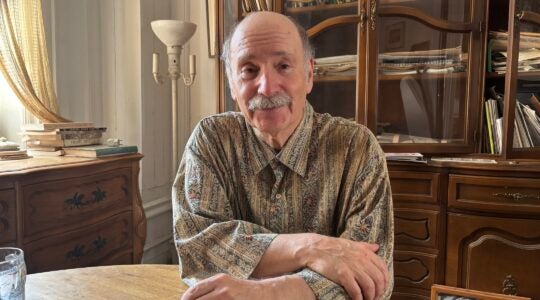It was early on a Saturday morning when Sam Eshaghoff lined up with other nervous high school students waiting to take the Scholastic Aptitude Test, commonly referred to as the SAT. Eshaghoff was not your average high school student — in fact, he was not a high school student at all. The 19-year-old student from Emory University was arrested in September 2011 for using fake IDs and posing as 16 different high school students and taking the SAT and ACT exams on their behalf.
Fifteen young adults, a mix of high school and college students, are facing misdemeanor charges; since they are 19 and younger their identities have not been made public, according to the Nassau County District Attorney’s office. One of the students incriminated in the process was 19-year-old Adam Justin, a graduate of the North Shore Hebrew Academy in Great Neck, L.I., and a student at Indiana University. Justin and Eshaghoff are facing felony charges of impersonation, falsifying business records and scheming to defraud others.
Additionally, two high school students from North Shore were arrested. One was charged with taking the test on someone’s behalf and the other was charged with hiring a proxy to take the test.
No one kvells when Jewish teenagers making front-page news for a suspected crime. “I was wondering if they internalized anything they were taught. I mean, we are told from a young age about giving credit to people who deserve it, and not letting others do our work for us,” said a senior from Ramaz Upper School in Manhattan who wished to remain anonymous. “For these kids to do this just makes all of us in the private Jewish school world look really bad.”
Soon it might be harder for such impersonations to occur. After the arrest of Eshaghoff and the other students, the College Board hired a big wig to improve test-taking security. Louis J. Freeh, former director of the FBI and now principal of the Freeh Group International Solutions, is reviewing security and will submit his proposals to the College Board, according to Tom Ewing, director of press relations at ETS. ETS administers the SAT exam on behalf of the College Board.
“When I took the SAT, I had to print out my registration and they checked my student ID to make sure I was the same person on the registration. Security wasn’t extremely tight, though. They didn't confiscate our cell phones or anything,” said Rachel Berger, a senior at the Fiorello H. LaGuardia High School of Music & Art and Performing Arts in Manhattan.
Previous security measures called for a valid photo ID and an admission ticket to the exam (which is issued after registration). The photo ID could be a school or government issued form of identification such as a passport or a driver's license. With these two items (along with pencils, erasers and optional calculator) a student would be allowed to sit for the exam which runs for approximately three or four hours. Clearly these security measures were not foolproof.
There have been rumors that students taking the SAT might be fingerprinted as part of the new security measures. Nassau County District Attorney Kathleen Rice, who prosecuted the students in September, suggested photographing students at the test site.
While some high school students seem pleased with the possibility of new security measures, others are not. “[F]ingerprinting would be more effective — you can’t fake a fingerprint,” said Elliot Linder, a junior at the Ramaz Upper School in Manhattan. Linder suspects that photographing students on-site could add to the tensions of the SAT.
Not everyone is convinced that new measures will improve security and reduce cheating. “I don’t think those measures are necessary,” said Berger, who has already taken the SAT. “It's bad enough that we have to sit through hours of testing without extra procedures.”
“I don't think that there’s anything they can do [to reduce cheating],” said Natalie Shemen, a junior at the Solomon Schechter School of Westchester in Hartsdale, N.Y.
The majority of students taking the SAT do so honestly. Out of the 2.25 million students who take the SAT every year, only 2,000 cases of copying are reported and investigated; only 1,000 of the scores are ultimately canceled as a result, according to the ETS’ Ewing. “Approximately 2.25 million students take the SAT every year. To say that there will never be cheating is impossible,” he said in a phone interview.
In fact, ETS receives tips regarding cheating from students who took the exam and volunteered the information. “It is common for school officials and guidance counselors to contact us with their suspicions about cheating. By having access to a student’s entire academic record, school officials have more information about possible discrepancies than does ETS,” said the ETS and the College Board in a joint statement communicated by Ewing.
In 2011 approximately 700 students were turned away preemptively from the test center because of questionable forms of identification — SAT proctors are trained to immediately dismiss anyone with a questionable ID. One hundred and seventy scores were canceled for impersonations.
Scores can be canceled by ETS for cheating, using an unapproved calculator or misbehaving during the test. Misbehavior includes talking about the test during breaks or using a cellphone during the test (including during breaks).
If impersonations, such as the ones in Great Neck, are suspected, the ETS will conduct a number of tests. For example, they will examine how students did on previous versions of the test and compare the scores with other students from the test center. Handwriting analysis is also used — before taking the test all students are required to write and sign a statement in cursive — to determine if there was an impersonation.
“Handwriting analysis confirmed our suspicions of impersonations,” said Ewing, referring to the case in Great Neck.
Initially it was the fact that the students’ SAT scores did not correspond to the students’ grade-point averages that tipped off the school’s principal. He, in turn, reported this discrepancy to ETS.
When a student is dismissed for any reason — even if he or she was dismissed for allegedly cheating — the student’s scores are immediately canceled, even if they have already been reported to colleges as part of the admissions process.
“Cancelled scores should not be used for admissions purposes. If we have reason to believe a score is not valid, we cancel it and notify colleges of such cancellation,” said the ETS and the College Board in a statement.
The reason for the cancellation, however, is not reported to the high school that the student is currently attending nor to any colleges that the student might be applying to. The student can also simply retake the SAT the next time it is offered. “That’s absolutely ridiculous,” said Linder, the Ramaz junior. “The colleges will have no way of knowing why your score was withdrawn.”
To dissuade cheating, some are suggesting publishing the names of students caught cheating or impersonating others. This list would be sent to test center supervisors, high schools and prospective colleges. However Berger, the LaGuardia senior, disagrees with this proposal. Since the College Board is a private entity, she believes its job is solely to administer the exam and give results, not punish students. “I think canceling the scores and not informing schools is an appropriate response,” she said.
Ewing agreed. “We are not a law enforcement agency — we cannot punish students,” he said. “We don’t feel that we are in a position to punish students for their actions.”
High schools, however, many chose to penalize students if they are caught cheating; additionally, like in Great Neck, a law enforcement agency may choose to arrest and prosecute the students in question.
“The accuracy of those scores is most important to us,” said Ewing. The purpose of the ETS is to offer valid SAT scores as part of a college admissions package or a scholarship application.
Asked what could be causing the impersonations and cheating, those interviewed blame the hyper-competitive college admissions race. “Kids are trying to see how much they could get away with,” Linder said.
Can cheating on the SATs be reduced? “Yes,” answered Shemen, the junior from Solomon Schechter. “If people calmed down about the SATs.”
The New York Jewish Week brings you the stories behind the headlines, keeping you connected to Jewish life in New York. Help sustain the reporting you trust by donating today.




